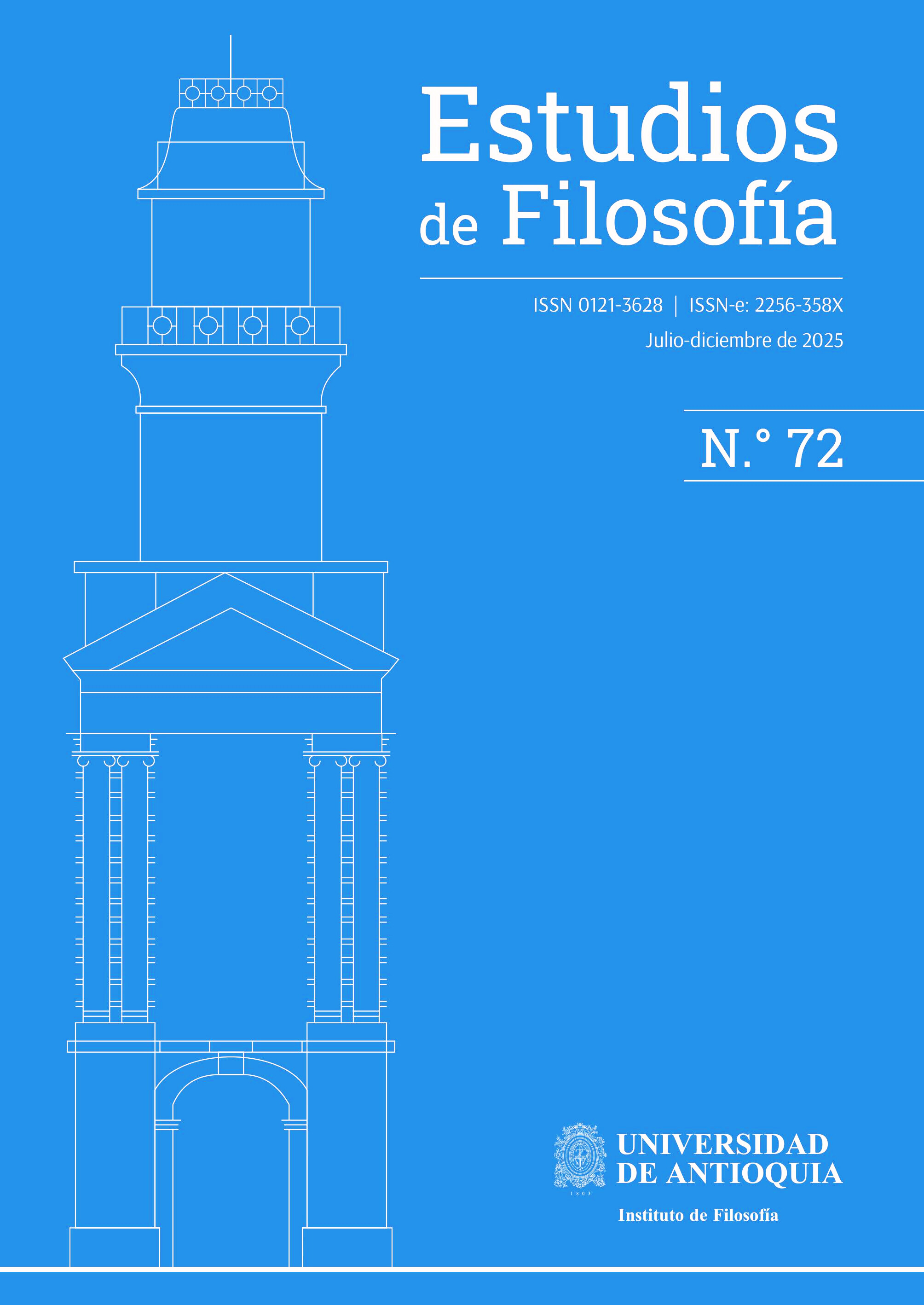Kuhnian Practical Politics: Why It’s (Epistemically) Virtuous to be (Evaluatively) Attached to a Paradigm
DOI:
https://doi.org/10.17533/udea.ef.356660Keywords:
Thomas Kuhn, Evaluative Attachment, Samuel Scheffer, Paradigms, Disciplinary Matrix, Impartiality, Value-free ideal of scienceAbstract
Is it epistemically vicious to be attached to a specific scientific paradigm? Such attachment clearly violates a norm of impartiality that is associated with the value-free ideal of science. I will argue that what Samuel Scheffler (2022) calls ‘evaluative attachment’ is not always epistemically vicious. In section 1, I will present Kuhn’s account of paradigms as embodying not just theoretical positions but also a ‘constellation of group commitments’ that Kuhn came to call a ‘disciplinary matrix’ (2012/1962, postscript). Section 2 evaluates Popper’s and Davidson’s criticisms of Kuhn, drawing on the work of Pablo Melogno (2020). Section 3 evaluates the claim that impartiality is a significant source of the value we accord to science. Section 4 appeals to Samuel Scheffler’s (2022) concept of evaluative attachment to argue that partiality to a specific framework or paradigm is not an epistemic vice. I conclude with brief observations, to be elaborated in future work, on how this argument applies to science in particular.
Downloads
References
Baltas, A., Gavroglu, K., & Kindi, V. (2000). A Discussion with Thomas S. Kuhn. In The Road Since Structure (pp. 253-323). University of Chicago Press.
Bird, A. (2022). Thomas Kuhn. The Stanford Encyclopedia of Philosophy, ed. E. Zalta. Retrieved from https://plato.stanford.edu/archives/spr2022/entries/thomas-kuhn/.
Brown, M. (2020). Science and Moral Imagination: A New Ideal for Values in Science. University of Pittsburgh Press. https://doi.org/10.2307/j.ctv18b5d19
Davidson, D. (1974). On the Very Idea of a Conceptual Scheme. Proceedings and Addresses of the American Philosophical Association, 47, 5-20. https://doi.org/10.2307/3129898
Douglas, H. E. (2009). Science, Policy, and the Value-Free Ideal. University of Pittsburgh Press. https://doi.org/10.2307/j.ctt6wrc78
Giere, R. N. (2013). Kuhn as Perspectival Realist. Topoi, 32(1), 53-57. https://doi.org/10.1007/s11245-012-9142-y
Hoyningen-Huene, P., & Sankey, H. (2001). Introduction to Incommensurability and Related Matters. Kluwer. https://doi.org/10.1007/978-94-015-9680-0
Kindi, V. (2012). Kuhn’s Paradigms. In V. Kindi & T. Arabatzis (Eds.), Kuhn’s the Structure of Scientific Revolutions Revisited (pp. 91-111). Routledge. https://doi.org/10.4324/9780203103159
Kuhn, T. (2012/1962). The Structure of Scientific Revolutions. University of Chicago Press. https://doi.org/10.7208/chicago/9780226458144.001.0001
Kuhn, T. (1977). The Essential Tension. University of Chicago Press. https://doi.org/10.7208/chicago/9780226217239.001.0001
Kusch, M. (2021). Relativism in the Philosophy of Science. Cambridge University Press. https://doi.org/10.1017/9781108979504
Longino, H. (1983). Beyond ‘Bad Science’: Skeptical Reflections on the Value-Freedom of Scientific Inquiry. Science, Technology, & Human Values, 8(1), 7-17. https://doi.org/10.1177/016224398300800103
Melogno, P. (2019). “The Discovery-Justification Distinction and the New Historiography of Science: On Thomas Kuhn’s Thalheimer Lectures.” HOPOS. The Journal of the International Society for the History of Philosophy of Science 9(1), 152–178. https://doi.org/10.1086/702308
Melogno, P. (2020). Interpretación, traducción y comunicación, variedades de la inconmensurabilidad. SCIO. Revista de Filosofía 18, 87-111. https://doi.org/10.46583/scio_2020.18.697
Murdoch, I. (2001). The Sovereignty of Good. Routledge. (Original published in 1970).
Planck, M. (1949). Scientific Autobiography and Other Papers (F. Gaynor, Trans.). Philosophical Library.
Popper, K. (1994). The Myth of the Framework: In Defence of Science and Rationality (M. A. Notturno, Ed.). Routledge.
Richardson, A. W. (2002). Narrating the History of Reason Itself: Friedman, Kuhn, and a Constitutive a Priori for the Twenty-First Century. Perspectives on Science: Historical, Philosophical, Social, 10(3), 253–274. https://doi.org/10.1162/106361402321899050
Rouse, J. (2013). Recovering Thomas Kuhn. Topoi: An International Review of Philosophy, 32(1), 59-64. https://doi.org/10.1007/s11245-012-9143-x
Scheffler, S. (2022). XIV—Partiality, Deference, and Engagement. Proceedings of the Aristotelian Society, 122(3), 319-341. https://doi.org/10.1093/arisoc/aoac012
Seidel, Markus. (2008). Von Wahrheit über Bedeutung zum Anti-Begriffsrelativismus? Davidsons Argumentation gegen den Begriffsrelativismus. Facta Philosophica, 10(1), 39-66. https://doi.org/10.3726/93528_39
Weber, M. 1949. The Methodology of the Social Sciences. The Free Press.
Wray, K. B. (2011). Kuhn’s Evolutionary Social Epistemology. Cambridge University Press. https://doi.org/10.1017/cbo9780511997990
Downloads
Published
How to Cite
Issue
Section
Categories
License
Copyright (c) 2024 Lydia Patton

This work is licensed under a Creative Commons Attribution-NonCommercial-ShareAlike 4.0 International License.
Authors who publish with this journal agree to the following terms:
1. The Author retains copyright in the Work, where the term "Work" shall include all digital objects that may result in subsequent electronic publication or distribution.
2. Upon acceptance of the Work, the author shall grant to the Publisher the right of first publication of the Work.
3. The Author shall grant to the Publisher a nonexclusive perpetual right and license to publish, archive, and make accessible the Work in whole or in part in all forms of media now or hereafter known under a Creative Commons Attribution-NoCommercia-ShareAlike (CC BY-NC-SA 4.0), or its equivalent, which, for the avoidance of doubt, allows others to copy, distribute, and transmit the Work under the following conditions: (a) Attribution: Other users must attribute the Work in the manner specified by the author as indicated on the journal Web site;(b) Noncommercial: Other users (including Publisher) may not use this Work for commercial purposes;
4. The Author is able to enter into separate, additional contractual arrangements for the nonexclusive distribution of the journal's published version of the Work (e.g., post it to an institutional repository or publish it in a book), as long as there is provided in the document an acknowledgement of its initial publication in this journal;
5. Authors are permitted, and Estudios de Filosofía promotes, to post online the preprint manuscript of the Work in institutional repositories or on their Websites prior to and during the submission process, as it can lead to productive exchanges, as well as earlier and greater citation of published work (see The Effect of Open Access). Any such posting made before acceptance and publication of the Work is expected be updated upon publication to include a reference to the Estudios de Filosofía's assigned URL to the Article and its final published version in Estudios de Filosofía.















